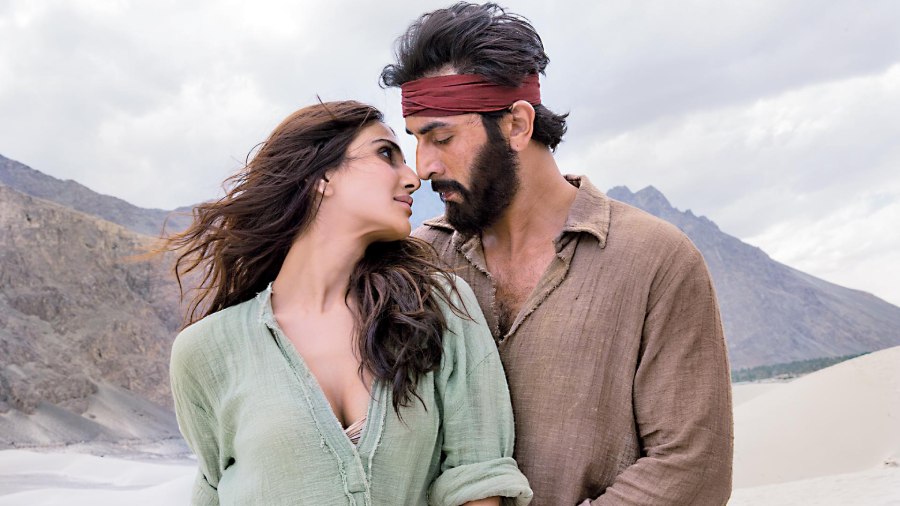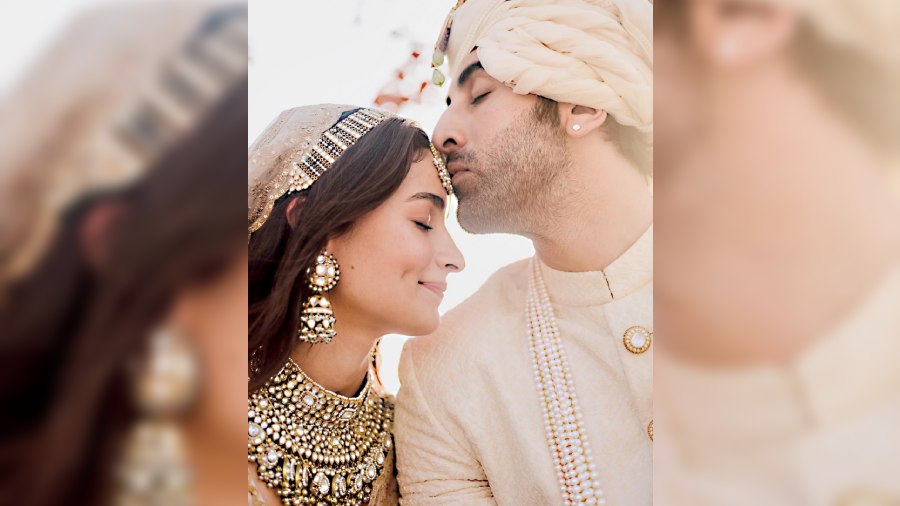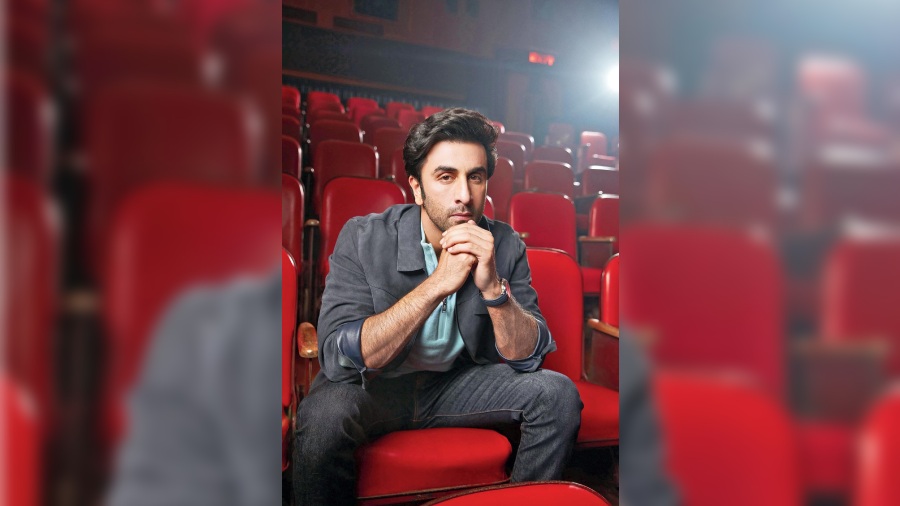Four years after his last release Sanju, it’s a Ranbir Kapoor Friday tomorrow. The actor who has had a great year so far — he got married to Alia Bhatt this April and the two are now expecting their first child — returns to screens in the big-ticket period action film Shamshera, in which he plays the first double role of his career. This will be followed by the release of the much-talked-about Brahmastra in early September, in which Ranbir and Alia will star together for the first time.
A freewheeling conversation with The Telegraph had Ranbir getting candid about doing his first larger-than-life film in the form of Shamshera, how he has changed as an actor but remained the same as a person, turning 40 this year and how he plans to embrace parenthood.
Having a theatrical release after the two years of the pandemic is in itself a big deal, and for you it’s a film release after four years. What are the emotions like? Is there an emotion more predominant than the rest?
You know, I have been talking about this with a lot of people, to Alia and everybody else. And I feel that the emotions are similar to what I felt just before the release of my debut film Saawariya. We have all worked very hard on Shamshera and it’s a mix of many emotions that I am feeling right now. It’s been four years since Sanju released, but I have been working through all these four years... I haven’t been sitting at home.
Yes, I had a personal setback in the loss of my father (Rishi Kapoor) and then we were all hit by the pandemic for a year-and-a-half. But before and after that, I have just been working on Shamshera and Brahmastra.
Of course, I do feel a little bit of nervous anxiety as to what the audience is going to say, how they will feel about a movie like this... it’s such a large-canvas film.... Those thoughts are there, but I am also excited to share the film with the audience.
This has, of course, been a great year personally for you so far, set to be crowned by two films releasing within two months of each other. You are all set to become a father too. Does it feel a little overwhelming at times or do you look at 2022 as a gift that keeps on giving?
I don’t feel overwhelmed, I feel happy. The kind of personality that I have... I never feel too low or too high. The personal news of becoming a parent is not comparable to anything else. That is overwhelming for sure.
But a film release is part of the job... I have been doing it for 15 years now. I hope I can do it for another 20, or even 30 years (smiles). I can’t let it consume me too much... I try and stay very balanced about it.

Ranbir Kapoor with Vaani Kapoor in Shamshera, releasing in theatres tomorrow
No two roles of yours have been the same, and Shamshera, of course, looks different from anything you have done so far. Besides the novelty aspect, what other boxes did this film tick for you?
How I have selected my films depends on what time of my life it’s come to me, the director, the story.... I had not done an action film before Shamshera, but even the story of the film really appealed to me. It’s something I have believed in. My choices also depend a lot on instinct, there is no fixed formula.
I have made some film choices in the past very deliberately but I don’t think those choices worked for me. So now I have learnt to follow my instinct. This business of film-making is such that you can’t tell what the outcome is going to be. Some things do well, some things don’t do well. You just need to stand by your film, you need to stand by what made you choose the film, you need to believe in the story and simply go with the flow.
Shamshera is a rare period film which is fictional. Your director Karan Malhotra took me through the challenges as well as the creative freedom of writing a script without a historical reference. As an actor, what were the challenges and did not having to play a real-life character from history feel liberating in a way?
I think not having a reference point is tough at the beginning. But there is also an advantage to it because then you don’t get inspired too much and become a cheap copy of something. I loved the story that Karan narrated to me so much that it inspired me, it motivated me. It really pushed me to work harder.
Yes, there was a lot of physical prep involved. I was playing two characters and so it was double the work. But the entire team — Karan, his crew, hair and make-up, the art designer, the costume designer — worked it out in tandem perfectly. So it became very easy for me to fit into both the characters.
As an actor, one definitely needs to bring in one’s perspective and try and bring out two different personalities. Honestly, it was a lot of fun for me. I had not played such larger-than-life characters before, I never had such massive set pieces to enact.... It was also tough to do. It was quite harrowing to shoot at the location we were at, but now when I have watched the film on the big screen, I understand what larger-than-life cinema is all about. Every actor eventually wants to see himself as a hero.
And I am sure that like many of us growing up in the ’80s and ’90s, larger-than-life Bollywood cinema was a staple for you...
Oh, absolutely! I come from a family that was a part of most of those big-screen blockbusters. Hailing from a film family, I was always a cinema lover. I have been to single-screen theatres and watched the typical Bollywood commerical films and at the same time, I have also grown up watching a lot of world cinema. I have always loved the big-ticket big-screen blockbusters.
You played Sanjay Dutt in your last release Sanju and in Shamshera, you are sharing screen space with him. I know you share a strong bond personally but what were the biggest learnings from working with him?
I think he is very sure about himself. He is not a selfish actor, he is someone who works for a film keeping everyone’s interests in mind. He never tries to hog the limelight. He never throws his weight around like, ‘I am the big star here’. He completely surrenders to the film and the vision of the director. Seeing him being so humble on set completely surprised me.
Sanjay Dutt always comes across as the quintessential bad boy, as a man who has always been a rebel. But let me tell you, he is primarily a student... he just wants to perfectly do what the director tells him. Whatever he does, he makes sure he does it to the best of his capabilities. He is still a child in many ways. I think that’s what keeps him relevant even after so many years.
Would you say you are a different kind of actor now from what you were four years ago?
You can’t really tell when you are making a film. It takes a few years to realise whether you have grown as an actor and to what extent. In the mad rush of life and work and other things, you don’t realise how your personality is changing. What Shamshera has given to me both as an actor and a human being is something I will realise a few years down the line. Right now, I really can’t tell.
But it’s definitely taught me a lot about the importance of conviction, especially when one is doing a film that’s as larger-than-life as this is. It’s a little easier to do films like Wake Up Sid and Rocket Singh because those are believable. Those stories are relatable and happen in real life. A film like Shamshera demands a lot of belief that one can pull it off. It’s important that you look confident enough to connect with your audience or you could end up looking like a fool.
Do you consciously seek life experiences that could potentially enrich you as an actor?
Honestly, after so many years in the business, I have gained the understanding that it’s not about my craft or about my acting... it’s always about the audience. You have to make films, you have to deliver performances that appeal to audiences... at the end of the day, it’s their entertainment. My job is to pick the right subjects and make my performances as believable and as entertaining as possible. And in that process, probably do some good acting also (smiles).
In the past, I have picked parts thinking, ‘Oh, this will give me a lot of scope to prove my acting prowess’, but as I am growing older, I am realising that it’s less about me and more about the audience.

Ranbir with Alia Bhatt at their April wedding
As an actor, what have been your biggest learnings from your father, mother and even from Alia, considering that she is already considered one of the best actors of this generation?
I have grown up with actors and now I am living my life with Alia. All the actors in my life are very individualistic in terms of approach and very passionate about their work. We are not changing the world in any way, but we have a lot of passion for our work.
At the same time, I have grown up around actors who didn’t bring their work home. One always needs to have some amount of personal space where we can disconnect and can just be. Otherwise you can get so consumed by this life, this glamour and this profession which is so much about heartbreak, that you can really lose yourself. So it’s very important to me that when I get back home, I need to have a little oasis of a normal life.
So Alia and you don’t discuss movies at all?
We do... we can’t really escape that! (Laughs) Honestly, she is more passionate about the movies than I am. But we both know how to demarcate our personal life from our career. For me, to be silent is far more important than to be over-talking about work. Alia is far younger than me (the two have a 11-year age gap). At her age, even I was as consumed by the movies and all that comes with it. As I have grown older, I have learnt how to detach and disconnect myself from the maddening world that comes with this career.
Jagga Jasoos turned five last week. It wasn’t received well on release but has found a loyal audience over the years. What are your best memories from working on that film?
I feel very surprised that a lot of my films that didn’t work at the box office — like Rocket Singh, Tamasha, Jagga Jasoos — have kind of found an audience over the years. We all work very hard and of course it’s disappointing when a film doesn’t do well.
As far as Jagga Jasoos is concerned, I think (director) Anurag Basu’s films are a reflection of who he is — crazy and full of heart. The film started as an idea after Barfi!. Since Barfi! had been accepted so well and we had a good creative collaboration, Dada (Anurag Basu) and I were sitting and discussing about what we should do next. I thought of an idea and told him that why don’t we do a detective film. He took a few months and came back with this idea of a stammering detective in a murder mystery cum father-son love story of sorts.
The idea of it was quite mad. The process was very chaotic, we shot it over a long period of time, there were a lot of ups and downs while making the film.... But it’s a film which is very close to my heart because it marked my debut as a producer. Lots of fond memories of working in Jagga Jasoos.
You will turn 40 this September. What would the Ranbir of today tell the Ranbir on his first day on the sets of Saawariya?
It may sound very stupid and even a lot of people who are close to me don’t believe me when I tell them this, but I actually haven’t changed much as a human being. How I approach my life and my work is very similar to how it was 15 years ago. Of course over the years, I have developed more skill sets, I have honed my existing skills and tried to become better as an artiste, but I have remained the same person. Fifteen years from now, I hope I can answer this question in the same way. The intention, of course, is always to become a better human being... be kinder, more loving, more giving....
Parenting is a whole different ballgame. Most of it is learnt while on the job but are you in any way mentally preparing yourself for fatherhood?
I would like to be a very hands-on father. In terms of prep, there’s a lot of conversations between Alia and me, many conversations with friends who have become parents... lot of reading, lot of planning. But as you said, the day my child is born is when I will really start learning and realise what it takes. Right now, there is a lot of imagination, a lot of dreams and many conversations.
